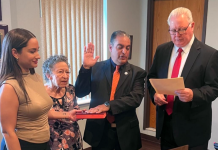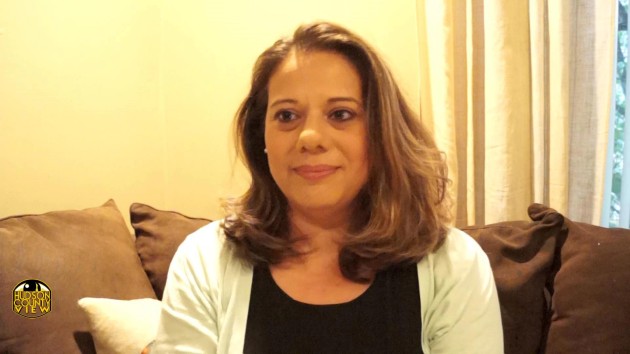Jersey City Mayor Steven Fulop, a Democratic candidate for governor, held a virtual Town Hall on his statewide education plan about a week-and-a-half after unveiling it.
By Daniel Ulloa/Hudson County View
Early on, Fulop noted that the cost of college has skyrocketed, noting that state schools like Rutgers University have become too expensive for many middle class families.
“You need some controls over that. Some caps on how and where they grow… is important,” he said about state college budgets.
Fulop said a family of four making $200,000 a year could still struggle to pay tuition due to the high cost of living in New Jersey.
He also argued county colleges as a path to higher education are often missed opportunity, noting that their budgets are sometimes cut by the legislature.
“The affordability conversation is real,” Fulop added.
He also had opinions on K-12 education in New Jersey.
“How and why your school district receives funds is an opaque process to most people. We need to clean that up so it becomes more transparent to the public so they can understand where and why those dollars are going,” the mayor added.
He said it was first adopted and implemented by former Gov. Jon Corzine, and the special needs funding process is especially peculiar.
“It’s something we would prioritize,” Fulop said before reiterating her support for universal pre-kindergarten.
“We’re going to continue the phased-in approach that Governor [Phil] Murphy and the legislature currently undertake. It remains a priority we will continue.”
The majority of the roughly hour-long session was spent taking questions from those on the call.
“Since the pandemic particularly, the state has had a challenge both recruiting new educators and keeping the educators we already have,” said Sean Cuffee, a teacher in Woodbridge.
He was also curious about Fulop’s thoughts on the New Jersey Education Association and their approach.
Fulop said he spoke to NJEA President Sean Spiller about ideas such as classroom training and obtaining grants for school districts.
“Nothing was offensive to me. But nothing to me seemed like it would solve the overall problem. Do you have any suggestions?” he asked.
“There are a lot of nuances. The culture of work has changed since the pandemic,” Cuffee replied. He continued that teaching is a more traditional position, versus flexible remote jobs which have become more popular recently.
Jason Kim eventually asked Fulop’s stance on negotiating with unions.
“As the Mayor of Jersey City, we deal with six-plus unions. We have experience settling contracts. We are generally very, very, very fair. We’ve been tough on discipline. We try to be fair and responsible with unions. My tone would be the same [with the NJEA],” Fulop answered.
On the local front, Fulop and Jersey City Education Association President Ron Greco have often been political adversaries.
Douglas Johnson, of Piscataway, had his son next to him when it was his turn to ask a question.
“Why does the food at his school stink so bad?” he asked, also expressing concern about the lack of diversity in schools.
“There is currently a case pending on this. We have some of the most segregated schools in our country. New Jersey still has a segregation question when it comes to housing and schools,” Fulop noted, asserting that Murphy should have addressed this issue head on.
He also claimed county schools would be more diverse, and that as governor, he would financially incentivize schools to push for diversity. Ending segregation in New Jersey schools is an emphatic point in Fulop’s education plan.
“We’ve lost hundreds of millions of dollars from S2,” said Brick Board of Education Trustee Victoria Pakala.
She also said that due to a change in policy, they went from having 60 students to 200 students in their ESL program.
“Just the cost of inflation is killing every school district. What are you going to do about it?” Pakala questioned.
Fulop said if elected to the state’s highest office, he would change how special education funding is allocated.
“The statewide special education population is supposed to be 12 or 14 percent. Our district is at 25,” Pakala said.
Fulop said the incentives need to be realigned. He blamed school budget cuts made under former Gov. Chris Christie that hurt schools across the state.
“The biggest loser in the state was Jersey City. We lost the most money,” Fulop argued.
He noted that since the city school district is getting progressively less money, the board of education is forced to increasingly raise taxes. Fulop criticized the process that seems to remove the intended sting of losing money.
“There shouldn’t be an additional slush fund on the side,” he continued.
Pakala said steep increases in property taxes hurts seniors and are not feasible.
“Public schools in this country rely heavily on property tax. There are many places where you don’t have a high tax base. So you get unequal funding. Everybody needs to pay. Why not take a penny or two of the sales tax and give it to the schools?” Deborah McWilliams asked. “
I want to stay in Jersey City. In the next 10 years, I might not be able to. Tax abatements and PILOTs (payment in lieu of taxes) should pay more.”
Fulop said the city stopped giving out tax abatements seven years ago, except for affordable housing projects. He added that sales tax hurts those who are struggling more than it affects the wealthy.
“It might be regressive. But everybody pays a sales tax. You can’t keep milking property taxes because then people might move,” McWilliams argued.
Fulop said he would get back to her before encouraging people to volunteer for the campaign. He also indicated that their June virtual Town Hall will focus on government reforms.









